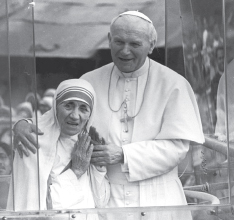Anyone even vaguely acquainted with my work knows that I advocate vigorous argument on behalf of religious truth. I have long called for a revival in what is classically known as apologetics, the defense of the claims of faith against skeptical opponents. And I have repeatedly weighed in against a dumbed-down Catholicism. Also, I have, for many years, emphasized the importance of beauty in service of evangelization. The Sistine Chapel Ceiling, the Sainte Chapelle, Dante’s Divine Comedy, Bach’s St. Matthew’s Passion, T.S. Eliot’s Four Quartets, and the Cathedral of Chartres all have an extraordinary convincing power, in many ways surpassing that of formal arguments. So I affirm the path of truth and the path of beauty. But I also recommend, as a means of propagating the faith, the third of the transcendentals, namely, the good. Moral rectitude, the concrete living out of the Christian way, especially when it is done in an heroic manner, can move even the most hardened unbeliever to faith, and the truth of this principle has been proven again and again over the centuries.
In the earliest days of the Christian movement, when both Jews and Greeks looked upon the nascent faith as either scandalous or irrational, it was the moral goodness of the followers of Jesus that brought many to belief. The Church father Tertullian conveyed the wondering pagan reaction to the early Church in his famous adage: “How these Christians love one another!” At a time when the exposure of malformed infants was commonplace, when the poor and the sick were often left to their own devices, and when murderous revenge was a matter of course, the early Christians cared for unwanted babies, gave succor to the sick and the dying, and endeavored to forgive the persecutors of the faith. And this goodness extended, not simply to their own brothers and sisters, but, astonishingly, to outsiders and to enemies. This peculiarly excessive form of moral decency convinced many people that something strange was afoot among these disciples of Jesus, something splendid and rare. It compelled them to take a deeper look.
Help us proclaim Christ in the culture
During the cultural and political chaos following the collapse of the Roman Empire, certain spiritual athletes took to the caves, deserts, and hills in order to live a radical form of the Christian life. From these early ascetics, monasticism emerged, a spiritual movement that led, in time, to the re-civilization of Europe. What so many found fascinating was the sheer intensity of the monks’ commitment, their embrace of poverty, and their blithe trust in divine providence. Once again, it was the living out of the Gospel ideal that proved convincing. Something similar unfolded in the thirteenth century, a time of significant corruption in the Church, especially among the clergy. Francis, Dominic, and their confreres inaugurated the mendicant orders, which is just a fancy way of saying the begging orders. The trust, simplicity, service to the poor, and moral innocence of the Dominicans and Franciscans produced a revolution in the Church and effectively re-evangelized armies of Christians who had grown slack and indifferent in their faith.
And we find the same dynamic in our time. John Paul II was the second most powerful evangelist of the twentieth century, but unquestionably the first was a woman who never wrote a major work of theology or apologetics, who never engaged skeptics in public debate, and who never produced a beautiful work of religious art. I’m speaking, of course, of St. Teresa of Kolkata. No one in the last one hundred years propagated the Christian faith more effectively than a simple nun who lived in utter poverty and who dedicated herself to the service of the most neglected people in our society.
There is a wonderful story told of a young man named Gregory, who came to the great Origen of Alexandria in order to learn the fundamentals of Christian doctrine. Origen said to him, “First come and share the life of our community and then you will understand our dogma.” The youthful Gregory took that advice, came in time to embrace the Christian faith in its fullness, and is now known to history as St. Gregory the Wonderworker. Something of the same impulse lay behind Gerard Manley Hopkins’s word to a confrere who was struggling to accept the truths of Christianity. The Jesuit poet did not instruct his colleague to read a book or consult an argument but rather, “Give alms.” The living of the Christian thing has persuasive power.
We have been passing through one of the darkest chapters in recent Church history. The clerical sex abuse scandals have chased countless people away from Catholicism, and a secularist tide continues to rise, especially among the young. My mentor, the late, great Cardinal George, surveying this scene, used to say, “I’m looking for the orders; I’m looking for the movements.” He meant, I think, that in times of crisis, the Holy Spirit tends to raise up men and women outstanding in holiness who endeavor to live out the Gospel in a radical and public way. Once again, I’m convinced that, at this moment, we need good arguments, but I’m even more convinced that we need saints.
This piece was originally published on February 21, 2017 on WordonFire.org.
